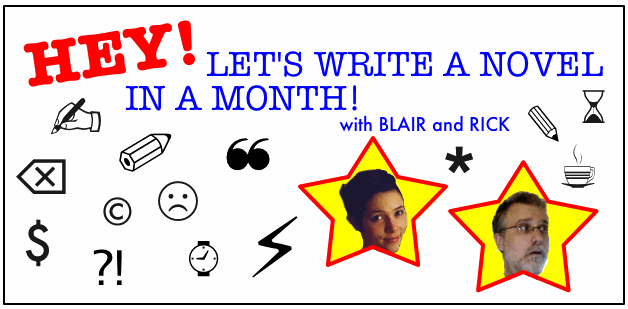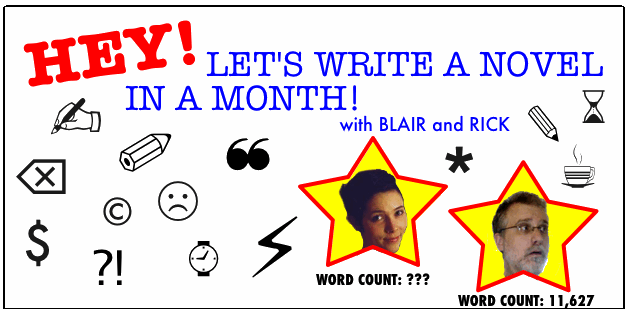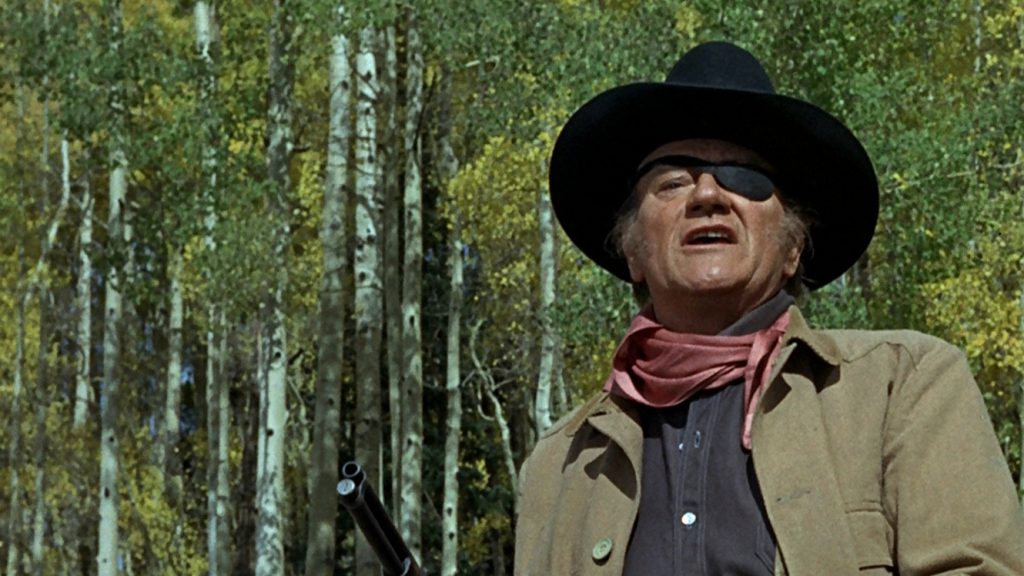Let’s Write a Novel in a Month: Part I
RC: Hi everybody, Rick Chillot here. You know what I like? Free time, sanity, a pain-free spine, a good night's sleep, what's left of my hairline…the list goes on and on. So when I came across the one-month-novel-writing event Camp NaNoWriMo, from the people behind National Novel Writing Month, my horror could not have been greater. And yet, I kept thinking about it. Is it truly possible to write a 50,000 word novel in one month? What would that experience be like? Would I absolutely hate it, or just moderately hate it? In the end, it seemed the only way to punish myself for even considering this was to sign up and try it, with the hope that the emotional scars would prevent me from making similar decisions in the future.
Knowing full well that I'm likely to bail out as soon as things get moderately inconvenient, I asked my Quirk colleague (or quirkleague, as we say around the office) Blair Thornburgh if she wanted to try this out as well, and join me in blogging about it all this month. All she had to do was say no and I'd be off the hook. Well, she called my bluff and so here we are. Blair, you told me that you've done this before. Any tips for a first-timer like me? And have you decided what you're going to write about?
BT: Hi Rick! Welcome to the crazy world of fast-paced novel-writing! Not to brag (but also to brag), but I've done this a couple of times and so am basically an expert. Just kidding! Because there is no such thing. The beauty of this writing exercise is that it's not for or about expertise. It's about getting yourself in the habit of writing. I first tried this way long ago when I was but sixteen years of age, and even thought I produced about 16,000 completely unreadable words of a medieval romance novel, I never ended up quote-unquote doing anything with them (well, that's not entirely true; they later formed part of a college essay.
Truth is stranger than even poorly-written romantic fiction!) But ever since then, I've been hooked on the writing habit. My first win (finished 50k!) was my freshman year of college. I've written NaNovels in three countries on two continents and gone to NaNo meetups in English and in French. I can't stop! The novels I wrote are…well, they exist, I'll say that. But! The NaNoWriMo approach is great for un-learning any hangups or mental blocks you have about writing. For me, it's more of a journey-not-the-destination-thing.
Speaking of destinations, let me confess: I'm setting a slightly different goal for this month. I'm shipping off for a camping trip in Big Sky Country for the first two weeks of July, and I'm also already working on revising a YA manuscript I wrote LAST fall. What I'm trying to do during my tenure at Camp NaNoWriMo is stay consistent. Put something on paper (or iPad) every day, even if it's the barest doodle of a sentence. In that process, I'll also blog (here!) about what happens AFTER the grand NaNo experiment (as their website puts it: "I Wrote a Novel. Now What?") Hopefully the combination of my veteran NaNo-er status and my keen editorial insight (ha!) will coalesce into something useful for all those intrepid writers out there. Like you!
 RC: Awrite, I commend your decision not to be around here for the next two weeks while I weep at my desk and become crippled with remorse and writer's cramp. In the meantime, let me ask you this: what works better for you when working on long writing projects? Sticking to a consistent schedule even if it means staring at the screen when nothing's happening creatively? Or working till you drop when inspiration hits, and not trying to force it when you're between brainstorms?
RC: Awrite, I commend your decision not to be around here for the next two weeks while I weep at my desk and become crippled with remorse and writer's cramp. In the meantime, let me ask you this: what works better for you when working on long writing projects? Sticking to a consistent schedule even if it means staring at the screen when nothing's happening creatively? Or working till you drop when inspiration hits, and not trying to force it when you're between brainstorms?
BT: I actually just read a quote about creativity (on Facebook, of all places) that speaks to this: "Creativity always comes as a surprise to us, therefore we can never count on it and we dare not believe in it until it has happened. […] Hence, the only way we can bring our creative resources fully into play is by misjudging the task, by presenting it to ourselves as more routine, simple, undemanding of genuine creativity than it will turn out to be" (Albert O. Hirschman).
I think this is VERY true—creativity is, in actuality, a mystic swirling of generative behavior in your brain that can't be bidden or wrangled or kept to a 9-to-5 schedule…and yet if you show up, so will it. Yes, ultimately, you're tricking yourself, but then again, isn't fiction kind of lying anyway? Like I said before, I think making a writing habit (however small, as long as it's regular) is what will make the art happen. If you can get yourself to associate desk-time with creating-time, eventually your brain makes the connection without having to be forced.
It's practically Pavlovian (ringing bells optional)! I like to think of writing as practice, both in the way you practice the violin or piano (to get better) and in the way you practice yoga or meditation (to get better, but also just for the sake of being present in the action).
So yes, I'd say I'm in the consistent-schedule-screen-staring camp. That said, I will totally work till I drop if the words are coming. And if it's really one of those days when writing is like pulling teeth, there's only so much tugging I can do before I throw in the towel (to mix some metaphors). But I keep a written record of the day's progress no matter what (or how little), and if it's possible, I do like to try to make up for it the next day, even if that means stopping midsentence or switching to a totally different scene to get back in the groove. Now I'm curious: do you find pre-planning (plotting, outlines, note cards, whatever) helpful? Or totally stifling? What's your modus scriptandi?
RC: I have to agree with you that putting yourself in the chair on a regular basis rather than waiting for lightning to strike is the way to go. Most of the writers I've talked to about this agree, though actually doing it is sometimes a miserable experience. One writing teacher told me that if he's not having a creative day, he'll spend the time working on the bricks and mortar. Checking for typos, trying better adjectives, reordering scenes, cleaning up dialog, etc.
As far as plotting goes, I like to have an outline to work from. I think it helps to have some kind of 10,000 foot overview so you can keep an eye on the shape of the thing. But I tend not to get very detailed and I end up hashing a lot of stuff out as I go. I've attempted to be more organized than that, with character lists and note cards and all that, but somehow it doesn't click for me.
Oh, crap. I just realized I'm supposed to be working on a novel. OK, let me just say this: By the end of this month, with Mighty Thor as my witness, I WILL have written at least 50,000 words and my story WILL be about a man who is hated by kittens and how he got that way. The manuscript may or may not involve Bigfoot.
Check back here for weekly updates from Blair and myself, and we'll try to rope in some other Quirk Books staffers and some of our authors to weigh in on the topic of writing (which really means rewriting, don't ya know). And if anyone out there is also participating in Camp Nanowrimo (not too late to sign up!), or in the midst of any other writing project that's sapping your will to live, please feel free to share your thoughts in the comments section below. Blair, any last words before the anguish begins?
BT: *dons sunglasses* Write on!


Rick Chillot
RICK CHILLOT is a former baby and current writer and editor at Quirk Books. He has contributed to magazines such as Psychology Today, Parenting, Mental Floss, and Prevention. In his twenty-plus years in publishing he’s interviewed about a jillion scientists and doctors and therefore had no need to consult any of them for this book.




